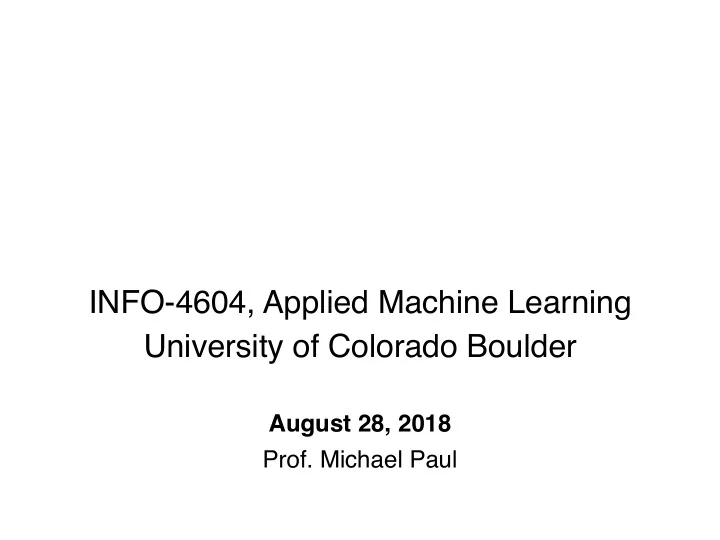

INFO-4604, Applied Machine Learning University of Colorado Boulder August 28, 2018 Prof. Michael Paul
People • Professor Michael Paul • 4th year at CU • 2nd year teaching this course • mpaul@colorado.edu • Teaching Assistant: Arcadia Zhang • Currently getting PhD at CU • arcadia.zhang@colorado.edu We will each hold 1 hour of office hours each week (2 hours total), time/place TBD; appointments possible
Information • Public website • Lecture slides, readings, policies • http://cmci.colorado.edu/classes/INFO-4604/ • Canvas • Discussion, assignments, grades • https://canvas.colorado.edu/courses/22139 • Make sure you have access!
What is machine learning? Murphy: • “a set of methods that can automatically detect patterns in data, and then use the uncovered patterns to predict future data” Essentially: learning from data (Learning to do what? We’ll see examples.)
What makes this applied? Compared to other courses… • More emphasis on using existing tools than implementing algorithms • But you’ll do a little bit of implementation too • Less mathematical theory • But you’ll still learn how the algorithms work • Math will be taught as needed • More focus on creating systems/pipelines (data processing, design, evaluation)
Goals After this course, you should be able to: • identify when machine learning can help solve a problem and which approaches are appropriate; • be comfortable doing machine learning in Python, and be familiar enough with the algorithms and parameters to easily adopt other toolkits; • understand the underlying concepts well enough that you can read machine learning papers, and can modify implementations for your own needs.
Background Programming background: Python • Class time is mostly about concepts, not code; expect to spend some time learning on your own Where to go for help? • Ask questions on Canvas • Asking (not just answering) questions on Canvas helps your participation grade! • Look at examples that come with the book; experiment with editing the code so that you understand it better
Background Math background: nothing specifically assumed (but some math skills needed) • Prior exposure to discrete math and probability is helpful (e.g., INFO-2301) • Concepts will be taught as needed Where to go for help? • Ask questions on Canvas • Review the free OpenIntro Statistics textbook
4604 vs 5604 Graduate students should be enrolled in 5604 5604 students will have to do additional problems on homework/quizzes/exams, and are assigned additional readings • 4604 students can do the 5604 problems for extra credit
Attendance If you need to miss a class, let me know before the lecture. Attendance is required on days that we have quizzes or in-class problems
Laptop Policy Laptops are not required (but helpful on occasion; I will announce which days) If you use a laptop in class, please be respectful of your neighbors (nothing distracting on your screen)
Homework • ~6 assignments • Jupyter notebooks • Combination of programming and written answers (mostly making observations about your results) • Expect to spend at least 10 hours on each assignment • Don’t procrastinate!
Homework • 5 “late days” • Once you’ve used up late days: • 80% credit within 1 day late • 60% credit after 1 day late • 0% credit after 7 days • See website for more details
Homework We will assign and grade the first programming assignment before the drop deadline (Wed, Sept 12) • It will be based on the code in Chapter 2 of the textbook • First 3 chapters available in Canvas
Quizzes 6-7 quizzes, dates will be announced • Worth 10% total
Recommend
More recommend